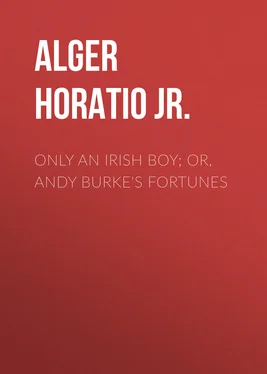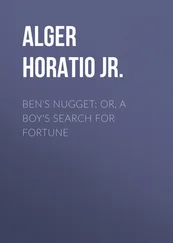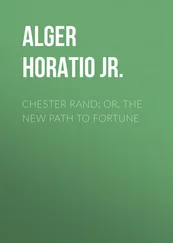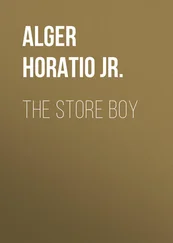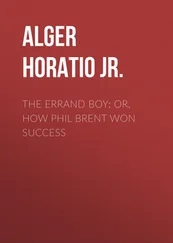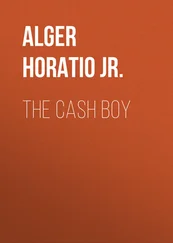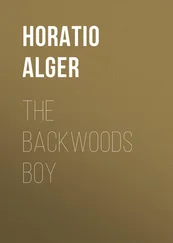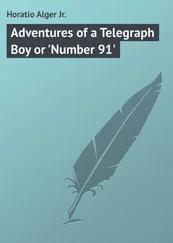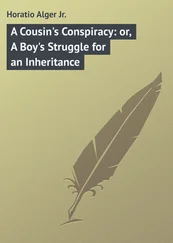Horatio Alger - Only an Irish Boy; Or, Andy Burke's Fortunes
Здесь есть возможность читать онлайн «Horatio Alger - Only an Irish Boy; Or, Andy Burke's Fortunes» — ознакомительный отрывок электронной книги совершенно бесплатно, а после прочтения отрывка купить полную версию. В некоторых случаях можно слушать аудио, скачать через торрент в формате fb2 и присутствует краткое содержание. Издательство: Иностранный паблик, Жанр: foreign_children, literature_19, foreign_antique, foreign_prose, на английском языке. Описание произведения, (предисловие) а так же отзывы посетителей доступны на портале библиотеки ЛибКат.
- Название:Only an Irish Boy; Or, Andy Burke's Fortunes
- Автор:
- Издательство:Иностранный паблик
- Жанр:
- Год:неизвестен
- ISBN:нет данных
- Рейтинг книги:3 / 5. Голосов: 1
-
Избранное:Добавить в избранное
- Отзывы:
-
Ваша оценка:
- 60
- 1
- 2
- 3
- 4
- 5
Only an Irish Boy; Or, Andy Burke's Fortunes: краткое содержание, описание и аннотация
Предлагаем к чтению аннотацию, описание, краткое содержание или предисловие (зависит от того, что написал сам автор книги «Only an Irish Boy; Or, Andy Burke's Fortunes»). Если вы не нашли необходимую информацию о книге — напишите в комментариях, мы постараемся отыскать её.
Only an Irish Boy; Or, Andy Burke's Fortunes — читать онлайн ознакомительный отрывок
Ниже представлен текст книги, разбитый по страницам. Система сохранения места последней прочитанной страницы, позволяет с удобством читать онлайн бесплатно книгу «Only an Irish Boy; Or, Andy Burke's Fortunes», без необходимости каждый раз заново искать на чём Вы остановились. Поставьте закладку, и сможете в любой момент перейти на страницу, на которой закончили чтение.
Интервал:
Закладка:
Jr. Horatio Alger
Only an Irish Boy; Or, Andy Burke's Fortunes
CHAPTER I ANDY BURKE
"John, saddle my horse, and bring him around to the door."
The speaker was a boy of fifteen, handsomely dressed, and, to judge from his air and tone, a person of considerable consequence, in his own opinion, at least. The person addressed was employed in the stable of his father, Colonel Anthony Preston, and so inferior in social condition that Master Godfrey always addressed him in imperious tones.
John looked up and answered, respectfully:
"Master Godfrey, your horse is sick of the disease, and your father left orders that he wasn't to go out on no account."
"It's my horse," said Godfrey; "I intend to take him out."
"Maybe it's yours, but your father paid for him."
"None of your impudence, John," answered Godfrey, angrily. "Am I master, or are you, I should like to know!"
"Neither, I'm thinking," said John, with a twinkle in his eye. "It's your father that's the master."
"I'm master of the horse, anyway, so saddle him at once."
"The colonel would blame me," objected John.
"If you don't, I'll report you and get you dismissed."
"I'll take the risk, Master Godfrey," said the servant, good-humoredly. "The colonel won't be so unreasonable as to send me away for obeying his own orders."
Here John was right, and Godfrey knew it, and this vexed him the more. He had an inordinate opinion of himself and his own consequence, and felt humiliated at being disobeyed by a servant, without being able to punish him for his audacity. This feeling was increased by the presence of a third party, who was standing just outside the fence.
As this third party is our hero, I must take a separate paragraph to describe him. He was about the age of Godfrey, possibly a little shorter and stouter. He had a freckled face, full of good humor, but at the same time resolute and determined. He appeared to be one who had a will of his own, but not inclined to interfere with others, though ready to stand up for his own rights. In dress he compared very unfavorably with the young aristocrat, who was biting his lips with vexation. In fact, though he is my hero, his dress was far from heroic. He had no vest, and his coat was ragged, as well as his pants. He had on a pair of shoes two or three times too large for him. They had not been made to order, but had been given him by a gentleman of nearly double his size, and fitted him too much. He wore a straw hat, for it was summer, but the brim was semi-detached, and a part of his brown hair found its way through it.
Now Godfrey was just in the mood for picking a quarrel with somebody, and as there was no excuse for quarreling any further with John, he was rather glad to pitch into the young stranger.
"Who are you?" he demanded, in his usual imperious tone, and with a contraction of the brow.
"Only an Irish boy!" answered the other, with a droll look and a slight brogue.
"Then what business have you leaning against my fence?" again demanded Godfrey, imperiously.
"Shure, I didn't know it was your fence."
"Then you know now. Quit leaning against it."
"Why should I, now? I don't hurt it, do I?"
"No matter—I told you to go away. We don't want any beggars here."
"Shure, I don't see any," said the other boy, demurely.
"What are you but a beggar?"
"Shure, I'm a gintleman of indepindent fortune."
"You look like it," said Godfrey, disdainfully. "Where do you keep it?"
"Here!" said the Irish boy, tapping a bundle which he carried over his shoulder, wrapped in a red cotton handkerchief, with a stick thrust through beneath the knot.
"What's your name?"
"Andy Burke. What's yours?"
"I don't feel under any obligations to answer your questions," said Godfrey, haughtily.
"Don't you? Then what made you ask me?"
"That's different. You are only an Irish boy."
"And who are you?"
"I am the only son of Colonel Anthony Preston," returned Godfrey, impressively.
"Are you, now? I thought you was a royal duke, or maybe Queen Victoria's oldest boy."
"Fellow, you are becoming impertinent."
"Faith, I didn't mean it. You look so proud and gintale that it's jist a mistake I made."
"You knew that we had no dukes in America," said Godfrey, suspiciously.
"If we had, now, you'd be one of them," said Andy.
"Why? What makes you say so?"
"You're jist the picture of the Earl of Barleycorn's ildest son that I saw before I left Ireland."
Godfrey possessed so large a share of ridiculous pride that he felt pleased with the compliment, though he was not clear about its sincerity.
"Where do you live?" he asked, with a slight lowering of his tone.
"Where do I live? Shure, I don't live anywhere now, but I'm going to live in the village. My mother came here a month ago."
"Why didn't you come with her?"
"I was workin' with a farmer, but the work gave out and I came home.
Maybe I'll find work here."
"I think I know where your mother lives," said John, who had heard the conversation. "She lives up the road a mile or so, in a little house with two rooms. It's where old Jake Barlow used to live."
"Thank you, sir. I guess I'll be goin', then, as my mother'll be expectin' me. Do you know if she's well?" and a look of anxiety came over the boy's honest, good-natured face.
The question was addressed to John, but of this Godfrey was not quite sure. He thought the inquiry was made of him, and his pride was touched.
"What should I know of your mother, you beggar?" he said, with a sneer. "I don't associate with such low people."
"Do you mane my mother?" said Andy, quickly, and he, too, looked angry and threatening.
"Yes, I do. What are you going to do about it?" demanded Godfrey.
"You'd better take it back," said Andy, his good-humored face now dark with passion.
"Do you think I am afraid of such a beggar as you?" sneered Godfrey.
"You appear to forget that you are speaking to a gentleman."
"Shure, I didn't know it," returned Andy, hotly. "You're no gentleman if you insult my mother, and if you'll come out here for a minute I'll give you a bating."
"John," said Godfrey, angrily, "will you drive that beggar away?"
Now, John's sympathies were rather with Andy than with his young master. He had no great admiration for Godfrey, having witnessed during the year he had been in his father's employ too much of the boy's arrogance and selfishness to feel much attachment for him. Had he taken any part in the present quarrel, he would have preferred espousing the cause of the Irish boy; but that would not have been polite, and he therefore determined to preserve his neutrality.
"That ain't my business, Master Godfrey," he said. "You must fight your own battles."
"Go away from here," said Godfrey, imperiously advancing toward that part of the fence against which Andy Burke was leaning.
"Will you take back what you said agin' my mother?"
"No, I won't."
"Then you're a blackguard, if you are a rich man's son."
The blood rushed to Godfrey's face on the instant. This was a palpable insult. What! he, a rich man's son, the only son and heir of Colonel Anthony Preston, with his broad acres and ample bank account—he to be called a blackguard by a low Irish boy. His passion got the better of him, and he ran through the gate, his eyes flashing fire, bent on exterminating his impudent adversary.
CHAPTER II A SKIRMISH
Andy Burke was not the boy to run away from an opponent of his own size and age. Neither did he propose to submit quietly to the thrashing which Godfrey designed to give him. He dropped his stick and bundle, and squared off scientifically at his aristocratic foe.
Читать дальшеИнтервал:
Закладка:
Похожие книги на «Only an Irish Boy; Or, Andy Burke's Fortunes»
Представляем Вашему вниманию похожие книги на «Only an Irish Boy; Or, Andy Burke's Fortunes» списком для выбора. Мы отобрали схожую по названию и смыслу литературу в надежде предоставить читателям больше вариантов отыскать новые, интересные, ещё непрочитанные произведения.
Обсуждение, отзывы о книге «Only an Irish Boy; Or, Andy Burke's Fortunes» и просто собственные мнения читателей. Оставьте ваши комментарии, напишите, что Вы думаете о произведении, его смысле или главных героях. Укажите что конкретно понравилось, а что нет, и почему Вы так считаете.
